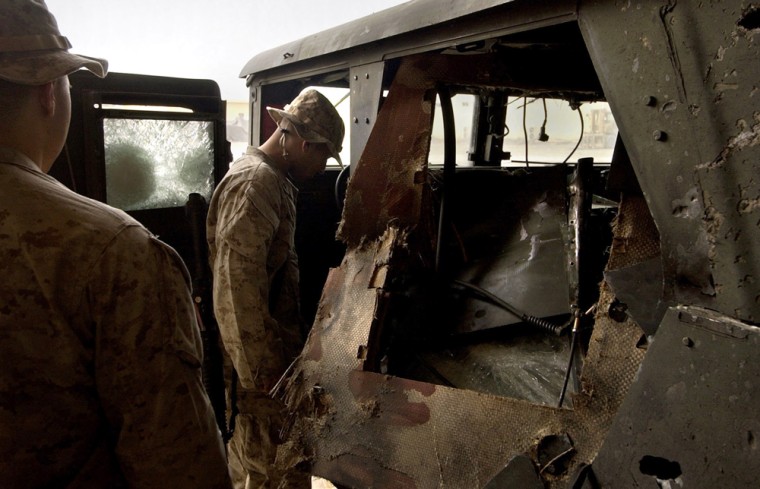An amalgam of many different tongues, English is the strangest of languages, but it is mostly Anglo-Saxon and French, with roots in Latin and Greek. Take the word “improvised,” as in “improvised explosive device.” It comes from the Latin improvisus, which means “unforeseen” or “unanticipated.”
This is pretty accurate at a couple of unpleasant levels. We didn’t anticipate the enemy’s ubiquitous use of explosives, and tactically we often discover them when they explode, a bit too late to do anything about them.
That the enemy in Iraq should rely heavily on IEDs should come as no surprise. Insurgents don’t like to engage American forces in combat because we usually crush them like bugs, and so they have resorted to the only tactic that consistently works for them: ambush.
Now, I have been ambushed many times, but never on a road. According to military doctrine — and common sense — one should not send a convoy down a main supply route until it has been secured, to the front and flanks, as far as the maximum effective range of the enemy’s weapons. Vehicles are vulnerable targets at the best of times, but traversing an unsecured piece of terrain is pure folly.
Then, why do we do it? Simply put, we don’t have enough troops to secure the roads we use. Instead, the Department of Defense is spending at least a billion dollars to develop sophisticated ways to detect and disarm IEDs. This expensive project notwithstanding, the majority of our casualties still come from explosive devices in ambushes rather than from gunfire in firefights.
Several years ago, when the nature of this threat reached the public consciousness, there was an outcry in Congress and in the media about the vulnerability of our vehicles, particularly Humvees. So, rather than do a better job of securing the roads in Iraq (impossible to do, remember, because we don’t have the forces), the Defense Department surrendered to the geniuses who screamed about converting Humvees into armored vehicles.
In the inviolable Law of Unintended Consequences, fully up-armored utility vehicles now weigh more than 5 tons apiece. This extra weight does an excellent job of ruining the drivetrain of the vehicle, but worse yet, Humvees can’t escape quickly from the kill zone of an ambush. Meanwhile, the insurgents have developed better ways of defeating our vehicles anyway, now using shaped charges that can penetrate any armor. Indeed, some IEDs have been successful in disabling American tanks.
To be sure, armored Humvees do a better job of protecting our troops than those that have no armor. And I have spoken to soldiers whose lives were saved, and some who even escaped serious injury, because of the protection afforded by the armor. But doing a better job of protecting troops, for all its obvious and intrinsic value, does not change the bankruptcy of the tactic that gives the enemy the opportunity in the first place.
This type of ambush attack, using explosive devices made more destructive with ball bearings and other penetrating debris, have had a devastating effect on those who are caught in the ambush kill zone. Traumatic amputations and penetrating brain wounds are the most shocking results. Troops may be saved from death by the excellence of our medical care, but they face long, painful and incomplete recoveries. And the recent revelations about conditions at Walter Reed Army Medical Center highlight that the success of soldiers’ recoveries requires supervision, vigilance and dedication commensurate with the selfless sacrifice of our wounded troops. We must continue to demand no less.
The method of defeating an insurgency is well known, but we have not been using it in Iraq because we have, from the beginning, tried to employ shortcuts to obviate employing the resources and tactics necessary to ensure success. It is unfortunate that one of the unanticipated results has been the success of improvised explosive devices.
Oh, and one more thing. The origin of the word “explosive”? From the Latin “explodere,” which means to use a loud noise to drive an actor off the stage.
